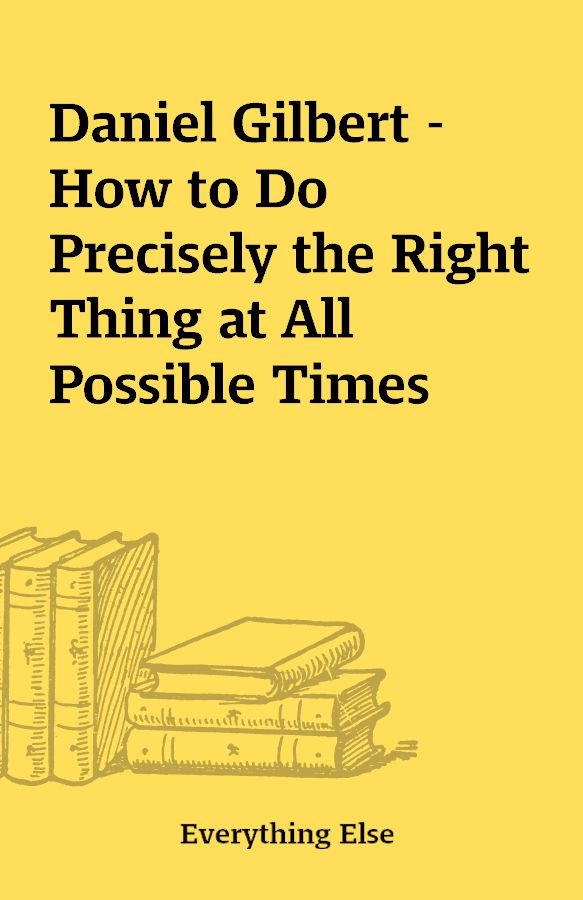Daniel Gilbert – How to Do Precisely the Right Thing at All Possible Times
Daniel Gilbert – How to Do Precisely the Right Thing at All Possible Times.mp3
[1 MP3]
Description
Quote:SxSW: How to do Precisely the Right ThingDan Gilbert’s SxSW 2006 talk, How to Do Precisely the Right Thing at All Possible Times, focused on how people make decisions. Several writers have taken a pass at this topic recently including Malcom Galdwell in Blink and James Surowiecki in The Wisdom of Crowds (more on his thesis soon).What I found most interesting about Dan’s approach is that his underlying principles behind decision-making map very well to how people perceive and interpret visual information and thereby understand visual design. In a nutshell, Dan presented a deviously simple formula for decision-making: expected happiness = odds of gain X value of gain. In other words, how good a decision is depends on the risk (odds) and the size of the pay-off (value). The problem is people are quite bad at estimating both odds and value and the reasons for this are tied to how we make sense of (perceive) the world around us.Errors in Estimating Odds • Easy estimates: what comes most quickly to mind is what you think is most probable. • However, what’s memorable is what stands out -not what is common. For example, standing in an exceptionally long line is very memorable but not very common. • Often our estimates are wrong. For example, when asked to estimate how many people have died from specific causes: tornados & fireworks are vastly overestimated while asthma & drowning are vastly underestimated. Our experiences of more dramatic causes of death (through media) create much more vivid pictures in our minds. • The truth is pools kill ten times more people than plane crashes, terrorists, and earthquakes. • Another example: when polled people think that the odds of getting mugged in Detroit are higher than getting mugged in Michigan. This has to do with the relative ease with which you can form a vivid picture in your mind of Detroit vs. Michigan. • Most of our mental effort is spent contemplating how things will go right. As a result, we tend to overestimate our chances of success.The human brain detect only detects CHANGES in stimuli. This is why you can’t smell yourself -because your smell does not change. Similarly, our eyeball is designed to jiggle because it can only detect changes of light on the retina. This simple fact explains why visual contrast is at the heart of visual communication. Contrast creates differences –differences our brains can perceive and interpret.Errors in Value • When determining value, context is everything. We compare everything to things around it. • The value of things changes based on what you compare them to Real Estate agents will often show you a very bad house first then take you to a better house right after. • Comparisons can dramatically damper our ability to make good decisions. • When we make choices we tend to focus on positives; when determining what not to do we focus on the negatives. • Marketers use the fact that context guides our decisions with aspiratio-al items such as very expensive wine as a comparison point to mid-priced wine. • The problem is the comparisons we make while shipping are not the comparisons we have available to use when consuming. The more expensive wine is simply not there when we get home.In summary, Dan pointed out that his original equation is actually quite useless because people simply cannot put it into practice. Our brains have not evolved much but our world has. As a result, our brain is trying to work in a world of things it was not made for so it often makes mistakes when trying to solve problems.Partially the same talk (on TED, Jul 2005), with video: http://www.ted.com/index.php/talks/dan_gilbert_researches_ha…
You must be logged in to post a review.






Reviews
There are no reviews yet.